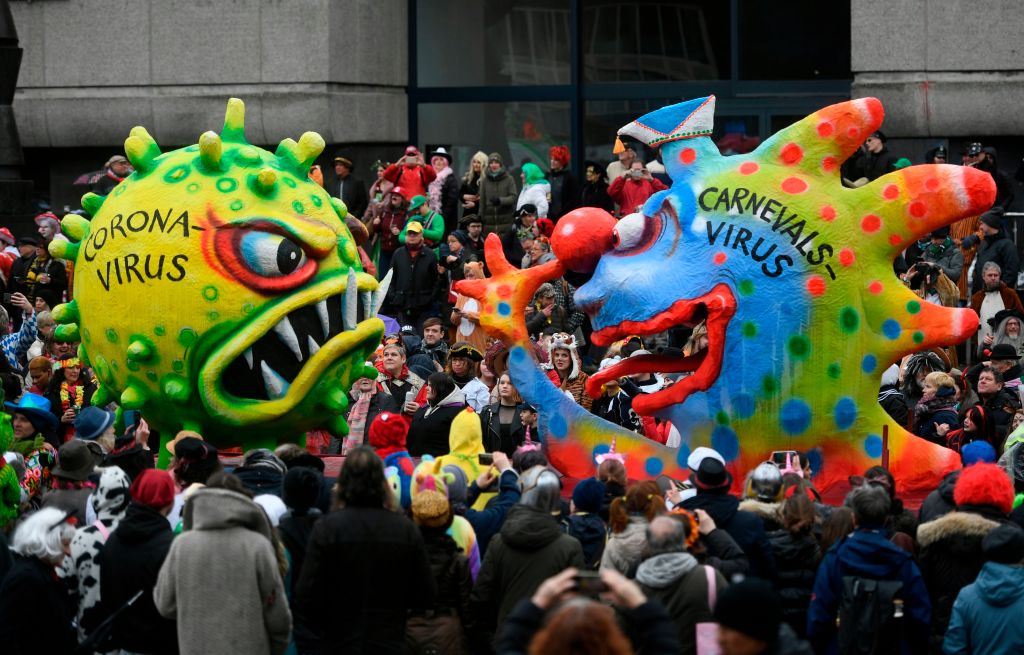Harvard epidemiologist: COVID-19 'scolding and shaming are toxic to public health'


A free daily email with the biggest news stories of the day – and the best features from TheWeek.com
You are now subscribed
Your newsletter sign-up was successful
Americans are effectively on their own when weighing the risks and benefits of just about every activity during the COVID-19 pandemic.
"Individuals have responsibility in an infectious disease outbreak, and more than usual in the sense that our choices affect other people," Harvard epidemiologist Julia Marcus told Vox's Ezra Klein in a podcast released Thursday. "But there's been a total abdication of responsibility at the top to create an environment in which individuals aren't burdened with that much risk and have to make those decisions entirely on their own."
That's a lot to ask, Marcus said, in part because "we're not asking people to just make a slight shift in their behavior — this is not just a seatbelt we're talking about. We're talking about asking people to make radical changes to their behavior that may be really counter to what they need and want in their everyday lives." Klein asked about "social shaming and scolding" people who disagree with us on the appropriate risk-reward balance, and Marcus urged people to avoid that:
The Week
Escape your echo chamber. Get the facts behind the news, plus analysis from multiple perspectives.

Sign up for The Week's Free Newsletters
From our morning news briefing to a weekly Good News Newsletter, get the best of The Week delivered directly to your inbox.
From our morning news briefing to a weekly Good News Newsletter, get the best of The Week delivered directly to your inbox.
I generally try to stay away from absolutist responses, but my instinct is to flat-out say no: Scolding and shaming are toxic to public health. Almost full stop, with very few exceptions. I think it's a natural instinct. .... But from a public health perspective, trying to shame somebody into changing their behavior just doesn't work. It doesn't deter the behavior generally. For some individuals, it might, but on a general population level, what it will do is actually just deter disclosure of the behavior. ... It's essentially saying you're a bad person for doing this. [Julia Marcus to Vox]
Marcus said it would be "far more productive," at least from a public health standpoint, to consider "how we can help people meet their needs," using college students as an example. Klein suggested it would be helpful to have a five to seven general guidelines, like being "permissive with outside activities," keeping your social interactions within "a stable set of people," and wearing a mask when you leave your social pod.
Marcus agreed. "We are not going to stop interacting as human beings," she said. "So let's find ways to keep our contacts at a minimum and keep them outdoors. If we work with that framework, I think there's a lot we can do." You can listen to the entire interview or read excerpts at Vox.
A free daily email with the biggest news stories of the day – and the best features from TheWeek.com
Peter has worked as a news and culture writer and editor at The Week since the site's launch in 2008. He covers politics, world affairs, religion and cultural currents. His journalism career began as a copy editor at a financial newswire and has included editorial positions at The New York Times Magazine, Facts on File, and Oregon State University.
-
 Political cartoons for February 22
Political cartoons for February 22Cartoons Sunday’s political cartoons include Black history month, bloodsuckers, and more
-
 The mystery of flight MH370
The mystery of flight MH370The Explainer In 2014, the passenger plane vanished without trace. Twelve years on, a new operation is under way to find the wreckage of the doomed airliner
-
 5 royally funny cartoons about the former prince Andrew’s arrest
5 royally funny cartoons about the former prince Andrew’s arrestCartoons Artists take on falling from grace, kingly manners, and more
-
 ‘One Battle After Another’ wins Critics Choice honors
‘One Battle After Another’ wins Critics Choice honorsSpeed Read Paul Thomas Anderson’s latest film, which stars Leonardo DiCaprio, won best picture at the 31st Critics Choice Awards
-
 Son arrested over killing of Rob and Michele Reiner
Son arrested over killing of Rob and Michele ReinerSpeed Read Nick, the 32-year-old son of Hollywood director Rob Reiner, has been booked for the murder of his parents
-
 Rob Reiner, wife dead in ‘apparent homicide’
Rob Reiner, wife dead in ‘apparent homicide’speed read The Reiners, found in their Los Angeles home, ‘had injuries consistent with being stabbed’
-
 Hungary’s Krasznahorkai wins Nobel for literature
Hungary’s Krasznahorkai wins Nobel for literatureSpeed Read László Krasznahorkai is the author of acclaimed novels like ‘The Melancholy of Resistance’ and ‘Satantango’
-
 Primatologist Jane Goodall dies at 91
Primatologist Jane Goodall dies at 91Speed Read She rose to fame following her groundbreaking field research with chimpanzees
-
 Florida erases rainbow crosswalk at Pulse nightclub
Florida erases rainbow crosswalk at Pulse nightclubSpeed Read The colorful crosswalk was outside the former LGBTQ nightclub where 49 people were killed in a 2016 shooting
-
 Trump says Smithsonian too focused on slavery's ills
Trump says Smithsonian too focused on slavery's illsSpeed Read The president would prefer the museum to highlight 'success,' 'brightness' and 'the future'
-
 Trump to host Kennedy Honors for Kiss, Stallone
Trump to host Kennedy Honors for Kiss, StalloneSpeed Read Actor Sylvester Stallone and the glam-rock band Kiss were among those named as this year's inductees
